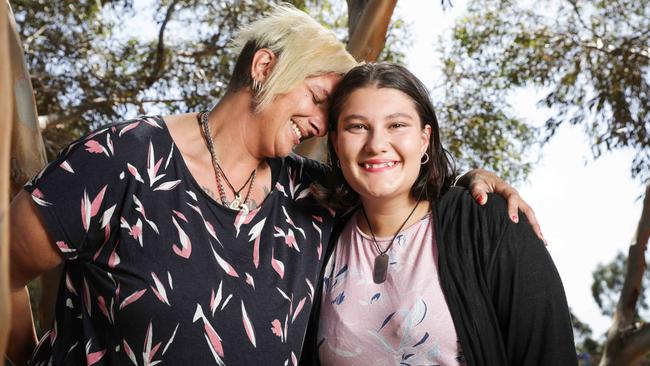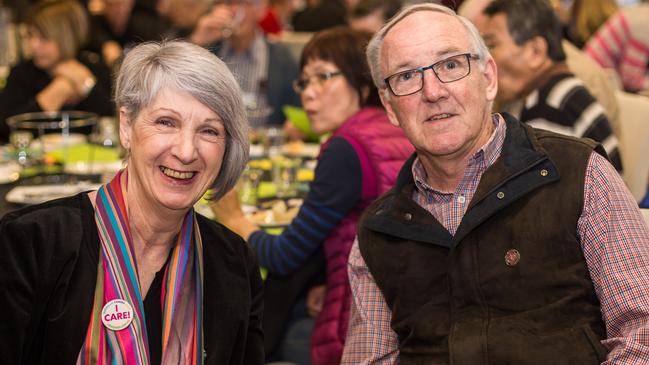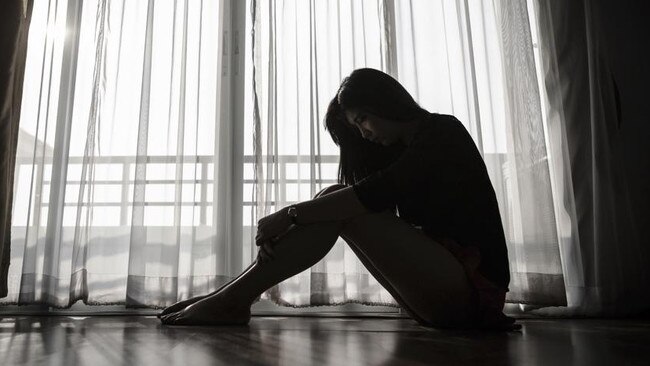Caring for a family member with mental illness
The impact of mental illness is felt not only by the patients themselves, but also by their carers, who often put their own lives on hold to help out. These families share their stories and struggles.
VIC News
Don't miss out on the headlines from VIC News. Followed categories will be added to My News.
Mental illness affects about 20 per cent of Australians every year, but there is also a ripple effect on families that is not always recognised.
Families can experience tension, uncertainty, mixed emotions and big changes when someone they love develops a mental health issue.
“There are a lot of different ways that complex mental health issues impact family and friends,” SANE Australia deputy CEO Dr Michelle Blanchard says.
“No one family’s experience is going to be the same.”
Organisations such as SANE Australia, Carers Victoria and Beyond Blue provide information and support services for family and friends.
“It’s important families are supported to talk openly about their experiences and how they can support one another to navigate through these challenges,” Blanchard says.
The Royal Commission into Victoria’s Mental Health System is under way and more than 8000 Victorians have made a submission to help shape the terms of reference.
Weekend has spoken to three families who care for someone with a mental health condition, illustrating how no single experience is the same.
(Some have chosen to protect the identity of their loved one by changing their name
or their loved one’s name.)
Sitting in a cafe in Reservoir, Taylor, 16, sips a milkshake and talks animatedly about her friends and family, favourite movies and books, and her hopes for the future. But the more she reveals, the less typical her life as a teenager appears.
Since the age of 12, Taylor has been a carer for her mother B*, 40, who suffers from depression and anxiety.
“I’ve always been able to feel when Mum is feeling anxious or a bit down,” Taylor says.
“I took the initiative when I was young and started helping her out with chores and looking after my brother and sister.”
Weekday mornings, the Year 10 student makes school lunches and helps her brother, 13, and sister, 9, get ready for school.
“If Mum’s not awake, I make sure she’s feeling all right, or if she’s gone to work, I ring and check she’s OK,” Taylor says.
B works for a post-construction cleaning company. It is run by a relative who understands her situation, but the work is sporadic and that adds to her stress.

“Last year was rough,” B says. “I had work and then I didn’t have work. That made me more anxious. All of a sudden I wasn’t able to pay bills. It was hard.”
It troubles her that Taylor has also experienced anxiety and depression since primary school.
“I have dyslexia and teachers used to get annoyed. They’d say, ‘You should know how to do it by now’,” Taylor says. “That was scary for me, as it was on top of the kids who were bullying me. I felt really alone.”
Taylor was diagnosed with depression in Year 3 after becoming withdrawn and refusing to go to school. She ended up attending three different primary schools.
“Mum helped me through everything. I think it made us a lot closer,” she says.
Taylor avoids using social media, preferring to hang out with friends she can trust.
“The three people I connect with the most, my tightest circle, have anxiety and depression and mental health issues as well,” she says. “I feel like we connect because we have so many relatable experiences.”
Taylor received a Young Carer Scholarship from Carers Victoria last year, which she used to buy a computer and pay for school excursions.
She is also grateful to Little Dreamers Australia, another organisation supporting young carers, for organising a night at Melbourne’s Crown Promenade hotel as part of its Dream Experience Program.
“It’s one of the best things that’s ever happened to me,” Taylor says.
She says being a young carer gives her inner strength and she would like to help other young people with mental health issues.
“I want them to realise that it will get easier and it does get better,” she says.
Taylor finds school work a struggle, but enjoys English, film studies, jewellery-making and cooking.
“I’m keeping an open mind about the future,” she says.

At a time when others their age are enjoying the freedom of retirement, Karen and Phil have been on a nightmarish journey with their adult son Brian*.
Brian seemed settled in his 30s. He had travelled the world, had a fulfilling job in legal services and enjoyed a leading role with public speaking and leadership organisation.
He had overcome short-term memory problems associated with sequential auditory memory disorder to get a degree and was managing an obsessive-compulsive disorder that developed after a random attack at a railway station when he was 19.
But Phil and Karen had no warning of the mental breakdown Brian would suffer at 35
that irrevocably changed their lives.
“Brian went on a holiday to Brisbane and came back a different person, in less than two weeks,” Karen says. “That’s how quick it can happen.”
Brian developed an obsession with his nose and sought treatment at every emergency department in Melbourne. He also couldn’t stop moving, a condition called akathisia, and wore out slippers at the rate of a pair a month.
“He regressed to a five-year-old. He didn’t sleep for six months and he’d walk into our bedroom and go, ‘Mum, Dad, Mum, Dad,’ and we’d say, ‘Go back to bed,’ ” Karen says.
“So, he’d go back to bed. And then he’d let himself out of the house and he would
walk the streets screaming.”
Concerned Brian’s behaviour could provoke a confrontation, they were advised to contact their nearest Victoria Police family violence unit.
“Although he’d never been violent, it meant his name was put on their watch list and the police would approach him in a much softer manner,” Karen says.
“We had a couple of episodes, one where we had to call the police because he was so agitated and he stood in the hallway and said, ‘Just take your gun and shoot me now.’
“It’s all those things that as a carer take their toll physically, emotionally and mentally.”
Brian was diagnosed with depression, anxiety and high-functioning broad-spectrum autism. He was admitted to a private facility, where he tried to suicide, but after five weeks he was discharged into Karen and Phil’s care.
The couple say they would not have coped without the support of Carers Victoria, a peak body representing unpaid carers.
They were assigned a case worker, saw a psychologist and attended seminars to help them navigate Victoria’s mental health care system. They describe their case worker as “a gorgeous woman and mentor”.
“We had our dark days and she was always there for us,” Phil says.
Brian’s behaviour became so bad, Phil had to physically remove him from a doctor’s consulting room after he refused to leave until he got the treatment he wanted.
Phil realised he could no longer cope. He wrote a letter explaining the situation and drove Brian to an emergency department.
“I said to him, ‘Sit down, you’ll be OK.’ I walked up to the triage nurse and I gave her the letter and I said, ‘I’m sorry to do this,’ and I walked out.
“Brian said to me, ‘Where are you going?’ And I said, ‘I’ll be back’.”
Brian was put on a compulsory treatment order and was an inpatient in the public and private health systems for more than four months.
“I couldn’t sleep for weeks,” Phil says. “I felt guilty that I had to do this.”
Brian tried to suicide again and was taken off all his medication to “dry him out”. He was given electroconvulsive therapy (ECT) as a last resort, and then moved to a community care centre.
Phil and Karen, who have been married 46 years, have faced their own physical and mental challenges.
“I had to go into counselling myself. I couldn’t laugh and I couldn’t cry. I couldn’t feel anything. It was like being numb,” says Karen, who also has a heart condition and overactive thyroid.
“Sometimes I would ring Lifeline at three in the morning, just to hear another voice.”
Phil has had two back operations, suffers anxiety and depression, and has been diagnosed with post-traumatic stress disorder (PTSD). Joining a Men’s Shed group has given him solace.
They have stayed connected to their local community — Karen as a volunteer at a school and
op shop and Phil as an umpire for a football competition.
Brian is now 40 and slowly recovering. He is back at work four days a week and living in a
share house.
“We are still not out of the woods, because patients who have mental health issues always have them,” Phil says.
Karen’s voice cracks as she talks about the friends who have supported them.
“I have a few close friends who have swept me up off the floor on a number of occasions, but by and large it has been Phil and I there for one another,” she says. “We have stuck together like glue.”

‘Walking on eggshells” is the way Tracey*, 47, describes caring for her husband and 16-year-old daughter, who both have borderline personality disorder (BPD).
The disorder affects 1 to 4 per cent of the population, with those affected having difficulty managing their emotions, impulses and relationships, according to SANE Australia.
“With my daughter, it presents with self-harm, intense feelings of abandonment, and poor self-image, whereas with my husband, he’s more impulsive, with frequent displays of temper, anger and substance abuse,” Tracey says.
Tracey, who also has a 13-year-old son, says most days involve conflict.
“I’m always walking on eggshells, and worried about what I’m saying,” she says.
“It’s difficult because you can’t be yourself.
“I’m always holding back. Some days I’m their favourite person and other days I get the blame for everything.”
Tracey met her husband at work in 1993 and found him caring and respectful. But problems soon surfaced after they married.
Over 20 years he has been diagnosed with depression, bipolar disorder, schizoaffective disorder and finally BPD.
“BPD often gets put in the too-hard basket,” Tracey says. “Some of the symptoms, like depression, can be treated with antidepressants, but the actual treatment is more therapy based.”
Her husband’s confrontational behaviour has led to stints of unemployment.
“If he went to work and had a fight with someone, or not liked what someone said, he’d just leave and be unemployed, without thinking about consequences,” she says.
“The financial burden has been huge.”
There have also been “run-ins with the law”, but he has avoided a jail sentence by completing mandatory programs as part of his bail conditions.
Tracey realised her daughter’s behaviour was more than teenage moodiness when she took an excessive dose of over-the-counter pain medication.
Her daughter was diagnosed with BPD last year.
“Often my daughter won’t make it to school, or she will look in the classroom and say, ‘I can’t be with that person today’. She’ll run off and come home,” Tracey says.
But having a diagnosis for her husband and daughter has helped her cope.
“It means you understand what’s causing their behaviours and responses, rather than thinking, at times, that these are really manipulative and horrible people,” she says.
Tracey is a SANE Australia peer ambassador and works as a carer peer support worker across two acute adult inpatient units, as well as a family carer consultant in Child and Youth Mental Health Services.
READ MORE:
HOW MUCH OF YOUR KIDS SHOULD YOU SHARE?
HOW TO TACKLE THE DEMANDS OF MOTHERHOOD
A MOTHER’S DAY WITHOUT A MOTHER
The roles stem from her voluntary work following post-natal depression with her second child.
“Rather than being a clinician, I’m able to share my experience in a way that other families can relate to,” Tracey says.
“It makes them feel less isolated and often they can tell me things that they don’t feel comfortable telling a clinician.”
She looks after her own wellbeing by exercising, getting enough sleep and going out to dinner once a week. But her real saviour has been a pet.
“I’ve always read that pets can be good for therapy but getting a cat has made the biggest difference to my wellbeing.”
*names have been changed
FOR HELP OR INFORMATION, CALL LIFELINE ON 13 11 14, KIDS HELPLINE ON 1800 55 1800 OR VISIT SANE.ORG; CARERSVICTORIA.ORG.AU OR BEYONDBLUE.ORG.AU


